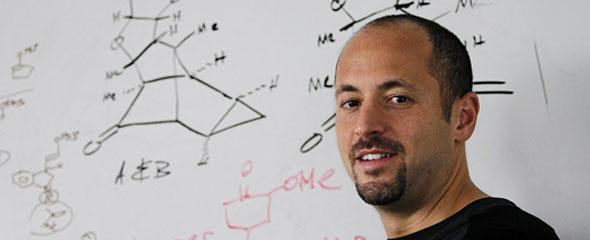“HZI and Technische Universität Braunschweig celebrate the award of the Inhoffen Medal which is given in recognition of world-leading research in the field of total synthesis of natural agents. In just a short period of time, Phil Baran has revolutionised the synthesis of organic natural compounds and set innovative impulses in synthetic methodology as well," says Prof Peter H. Seeberger, laudator and director of the Max Planck Institute of Colloids and Interfaces, in honour of Baran's achievements.
Phil Baran is one of the outstanding natural substance chemists of our time. He managed to significantly increase the synthesis efficacy for highly complex natural substances by establishing a variety of new methods that minimise preparatory and ancillary steps of the synthesis.
Phil Baran majored in chemistry at the New York University and received his doctorate in 2001 at the Scripps Research Institute (SRI). He then worked as a scientist at Harvard University and returned to the SRI in 2003 to set up his own research group. He has received numerous awards including a Mukaiyama Award, the Emmanuel Merck Lecture and a MacArthur Fellowship.
The Inhoffen award of the HZI sponsors' association, worth €8000, is the most prestigious German award in the field of natural substance chemistry. The award will be presented in the scope of the Inhoffen Lecture, a joint event of HZI, Technische Universität Braunschweig and the Friends of the HZI. The ceremony is scheduled to be held on Friday, April 12, at 15 pm in the Forum of the HZI.
In the scope of the Inhoffen Lecture, the HZI sponsors' association also honours outstanding doctoral theses in life sciences. This year's sponsor awards, worth €1000 each, go to Dr Katharina Borst of the TWINCORE - Centre for Experimental and Clinical Infection Research and to Dr Michael Kany of the Helmholtz Institute for Pharmaceutical Research Saarland, a branch location of the HZI. Borst researched the behaviour of myeloid liver cells during infection with viral hepatitis, whereas Kany investigated patho-blocker targets in pathogenic bacteria.
To commemorate the chemist Hans Herloff Inhoffen (deceased in 1992), the Technische Universität Braunschweig and the HZI (formerly: German Research Centre for Biotechnology or GBF) annually organise the Inhoffen Lecture (since 1994) at which the award bearing his name is presented. Inhoffen taught at the Technische Universität Braunschweig from 1946 to 1974 and served as its rector from 1948 to 1950. Moreover, in 1965, he founded the Institute for Molecular Biology, Biochemistry and Biophysics (IMB), the predecessor institution of the GBF and, by extension, of the Helmholtz Centre for Infection Research.
Photo and interview opportunity:
Prior to the event, media representatives will have the opportunity to meet with and take pictures of the laureates at 14:30 pm. For more information, please phone 0531 6181-1400, Susanne Thiele, head of Press and Communication at the HZI.

